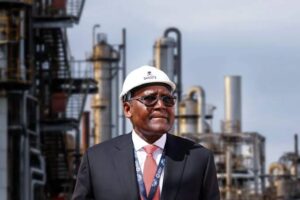
Nigeria’s national oil company has remained a sorry bundle of contradictions for itself and for the nation, whether in its old form as a public corporation or in its current incarnation as a pretend private entity, the Nigeria National Petroleum Company Limited (NNPCL).
Every now and then for over four decades in Nigeria, the NNPCL boils to the surface of national news not to announce ground-breaking innovations in any areas of its activities, but to find itself in yet another allegation of wrongdoing or impropriety, each seemingly worse than the one before it. In just the past week alone, the NNPCL has been mired in allegations of secret recruitment, which it denies, and the serious accusation by an industry watchdog that it failed to remit nearly two billion dollars to the federation account in 2021.
Two allegations of impropriety against a single organization in a week are enough to test the credibility of that organization in the public domain, even for an organization such as the NNPCL. But if the former–allegation of secret recruitment—could be ignored as no more than the rambles of online mischief-makers, the latter cannot, and must not, be so easily dismissed.
The Nigeria Extractive Industries Transparency Initiative (NEITI) is an agency of the federal government with a mandate to monitor and ensure transparency and accountability in Nigeria’s extractive sector, for the benefit of all Nigerians. As a government agency that grew out from a third sector initiative, NIETI’s main tool for achieving its mandate is public disclosure of the goings on in the oil, gas and solid minerals sectors, usually through public reports.
Last Monday, NIETI released its 2021 Oil and Gas Industry Report, which among other things, revealed that the NNPCL failed to remit a total of $1.95 billion to the government in 2021. The report said in part that “about $1.95bn, or 8.47% of the total revenue was not transferred to the Federation Account by the NNPCL during the year under review. Breakdown of the withheld revenue included, $722.6million for NLNG dividend; $871.15mn from domestic crude sales, $859,583 miscellaneous revenue and $286.42mn from export crude sales. $24.332million and $45.76million were withheld from transportation revenue and domestic gas proceeds”.
These sums are separate from the total of $6.931billion or about N4.83 trillion in today’s exchange rate of “quasi-fiscal expenditure” which the report said “were deducted from the Federation’s revenue before remittance without appropriation by the National Assembly”.
Moreover, the report showed that “none of the refineries was operational in 2021 despite spending about N200billion between 2020 and 2021 on refinery rehabilitation which was deducted from the Federation sales proceeds. These deductions the report reiterated, remains a heavy cost to Federation Revenue remittances”. Also, the report showed that “total metered crude oil production was 634.60 million barrels, out of which the nation lost 68.47 million barrels to production adjustment, measurement error, theft and sabotage”.
In other words, the NNPCL appears to be bleeding the federal government billions of dollars from all possible sides: unremitted revenues, maintenance costs for non-operational refineries, and unmet oil production quotas. And yet, staggering as all of these are in the report, they are just for one year, 2021.
Like many Nigerians, we demand explanations from the NNPCL for all these seeming anomalies. Where are the unremitted funds and why were they not remitted? What is the state of the refineries for which N200 billion was spent in 2021? How much was spent on the refineries in 2022 and in 2023 so far? Why is no refinery working and refining any crude? Given the scale of sums involved and their significance to the national economy, Nigerians are entitled to answers for these questions. And we urge NNPCL to come forth with them.
We note that over the past few years, some leaders have expressed grave concerns over aspects of the NNPCL operations, from its daily fuel consumption figures to its non-remittance of funds. The immediate past Controller General of the Nigeria Customs Service and the former Governor od Kaduna State, Malam Nasir El-Rufai were among those who raised such concerns. But to date, the NNPCL has not provided Nigerians with satisfactory answers.
But to these concerns we must add the NNPCL’s management of fuel subsidy payments before their abrupt and outright removal by the federal government last May. According to a May 2023 report by PwC Nigeria titled “Fuel subsidy in Nigeria – issues, challenges and the way forward”, the federal government paid a total of N1.4 trillion in fuel subsidies in 2021. By 2022, subsidy payments had jumped to N4.4tillion, more than three times the amount for the previous year. How is this increase—over 300%–to be explained in just a year?
It is indeed sad that unlike its peers in many developing countries, Nigeria’s oil company has remained more a source of questions than answers for our national development. National Oil Companies (NOCs) were established in the 1970s in many oil-rich developing countries in order to ensure better and more effective local control of oil resources, against the predatory practices of the older and stronger international oil companies.
For Advert, Event Coverage, Story/Article Publication, Change Of Name & Placement In Newspapers, PR & Other Media Services
Contact Us On: WhatsApp
Send Email To: citizennewsng@gmail.com
Visit Citizen NewsNG To Read More Latest And Interesting News













